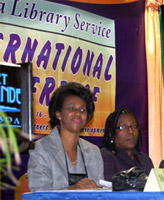Caribbean information literacy programmes discussed at international conference
05-03-2009 (Kingston)

Panel discussion
© UNESCO
The impact of information literacy programmes on educational development in Bahamas, Belize, Jamaica, and Trinidad and Tobago was explored on 17 February 2009 in a panel discussion sponsored by UNESCO at the Jamaica Library Service 60th Anniversary International Conference. The Conference was held in Ocho Rios, Jamaica, under the theme ‘Public and School Libraries: Your Partners in National Development’.
The panel included representatives of university and public libraries from the concerned Caribbean countries. Norma Amenu-Kpodo, from the University of the West Indies, Jamaica, explored the use, in her University, of a marketing function and an online learning platform. Workshops, flyers, skits and other marketing strategies have contributed to the University’s recognition of its goal to train approximately 2000 students from all disciplines annually.
Dorcas Bowler, from the Bahamas Public Library Service, highlighted the partnership with UNESCO that helped promote information literacy clubs and recruit library cadets in Bahamas in order to stimulate an interest in librarianship and to sustain this profession within the country.
The case study of Belize explored the School’s Wide Area Network (SWAN) project and stressed the importance of government’s role in facilitating growth in education. SWAN, which aimed to harness the use of ICT in education, to improve national welfare and to secure Belize’s place in the global economy, failed because of several reasons:
Kwame Boafo, Director of UNESCO’s Office in Kingston and a keynote speaker at the Conference, stressed the critical role played by public and school libraries in advancing national development. According to him, those libraries served as a medium for information professionals and local policymakers to share experiences and best practices on how to provide better services to clients.
Dorcas Bowler, from the Bahamas Public Library Service, highlighted the partnership with UNESCO that helped promote information literacy clubs and recruit library cadets in Bahamas in order to stimulate an interest in librarianship and to sustain this profession within the country.
The case study of Belize explored the School’s Wide Area Network (SWAN) project and stressed the importance of government’s role in facilitating growth in education. SWAN, which aimed to harness the use of ICT in education, to improve national welfare and to secure Belize’s place in the global economy, failed because of several reasons:
- loss of national control upon the telecommunications industry in favour of foreign investors;
- minimal progress in information literacy at the national level;
- use of Internet as the ultimate resource, minimising the role of libraries and other information services; and
- inability of government institutions to maintain the technology.
Kwame Boafo, Director of UNESCO’s Office in Kingston and a keynote speaker at the Conference, stressed the critical role played by public and school libraries in advancing national development. According to him, those libraries served as a medium for information professionals and local policymakers to share experiences and best practices on how to provide better services to clients.
The Jamaica Library Service has been providing free information services since 1948. It now embraces 614 public library access points and 926 school libraries. Since its establishment, the Service has constantly worked to stay the largest library network in Jamaica and one of the most comprehensive in the Caribbean.
Related themes/countries
· Latin America/Caribbean
· Bahamas
· Belize
· Jamaica
· Libraries
· Trinidad and Tobago
· Information and Media Literacy
Share this story:
Contact information
-
Contact
- Isidro Fernandez-Aballi, UNESCO Office in Kingston
- Kimberlyn Williams, Jamaica Library Service
- UNESCO
Source














